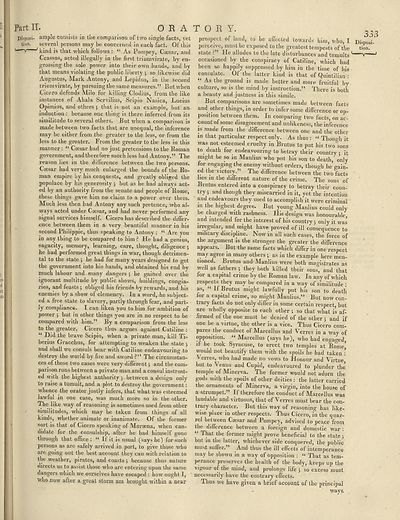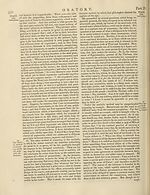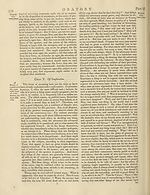Encyclopaedia Britannica > Volume 15, NIC-PAR
(383) Page 333
Download files
Complete book:
Individual page:
Thumbnail gallery: Grid view | List view

Part II.
ORA
Disposi- ample consists in the comparison of two single facts, yet
tion. several persons may be concerned in each fact. Of this
U“‘V—kind is that which follows : “ As Pompey, Caesar, and
Crassus, acted illegally in the first triumvirate, by en¬
grossing the sole power into their own hands, and by
that means violating the public liberty j so likewise did
Augustus, Mark Antony, and Lepidus, in the second
triumvirate, by pursuing the same measures.” But when
Cicero defends Milo for killing Clodius, from the like
instances of Abala Servilius, Scipio Nasica, Lucius
Opimius, and others j that is not an example, but an
induction: because one thing is there inferred from its
similitude to several others. But when a comparison is
made between two facts that are unequal, the inference
may be either from the greater to the less, or from the
less to the greater. From the greater to the less in this
manner: “ Caesar had no just pretensions to the Roman
government, and therefore much less had Antony.” The
reason lies in the difference between the two persons.
Caesar had very much enlarged the bounds of the Ro¬
man empire by his conquests, and greatly obliged the
populace by his generosity ; but as he had always act¬
ed by an authority from the senate and people of Rome,
these things gave him no claim to a power over them.
Much less then had Antony any such pretence, who al¬
ways acted under Caesar, and had never performed any
signal services himself. Cicero has described the differ¬
ence between them in a very beautiful manner in his
second Philippic, thus speaking to Antony : “ Are you
in any thing to be compared to him ? He had a genius,
sagacity, memory, learning, care, thought, diligence j
he had performed great things in war, though detrimen¬
tal to the state ; he had for many years designed to get
the government into his hands, and obtained his end by
much labour and many dangers ; he gained over the
ignorant multitude by public shows, buildings, congia-
I’ies, and feasts ; obliged his friends hy rewards, and his
enemies by a show of clemency. In a word, he subject¬
ed a free state to slavery, partly through fear, and part¬
ly compliance. I can liken you to him for ambition of
power ; but in other things you are in no respect to be
compared with him.” By a comparison from the less
to the greater. Cicero thus argues against Catiline :
11 the brave Scipio, when a private man, kill Ti¬
berius Gracchus, for attempting to weaken the state ;
and shall we consuls bear with Catiline endeavouring to
destroy the world by fire and sword ?” The circumstan¬
ces of these two cases were very different j and the com¬
parison runs between a private man and a consul instruat-
ed with the highest authority ; between a design only
to raise a tumult, and a plot to destroy the government:
whence the orator justly infers, that what was esteemed
lawful in one case, was much more so in the other.
The like way of reasoning is sometimes used from other
similitudes, which may be taken from things of all
kinds, whether animate or inanimate. Of the former
sort is that of Cicero speaking of Mursena, when can¬
didate for the consulship, after he had himself gone
through that office : “ If it is usual (says he) for such
persons as are safely arrived in port, to give those who
are going out the best account they can with relation to
the weather, pirates, and coasts ; because thus nature
directs us to assist those who are entering upon the same
dangers which we ourselves have escaped : how ought I,
who now after a great storm am brought within a near
T O R Y. 333
prospect of land, to he affected towards him, who, 1 Disposi *
perceive, must be exposed to the greatest tempests of the tion.
state ?” He alludes to the late disturbances and tumults ' V—
occasioned hy the conspiracy of Catiline, which had
been so happily suppressed by him in the time of his
consulate. Of the latter kind is that of Quintilian :
“ A® ^le ground is made better and more fruitful by
culture, so is the mind by instruction.” There is both
a beauty and justness in this simile.
But comparisons are sometimes made between facts
and other things, in order to infer some difference or op-
position between them. In comparing two facts, on ac¬
count of some disagreement and unlikeness, the inference
is made from the difference between one and the other
in that particular respect only. As thus : “ Though it
was not esteemed cruelty in Brutus to put his two sons
to death for endeavouring to betray their country • it
might be so in Manlius who put his son to death/ only
for engaging the enemy without orders, though he gain¬
ed the victory.” The difference between the two facts
lies m the different nature of the crime. The sons of
Brutus entered into a conspiracy to betray their coun¬
try ; and though they miscarried in it, yet the intention
and endeavours they used to accomplish it were criminal
in the highest degree. But young Manlius could only
be charged with rashness. His design was honourable,
and intended for the interest of his country; only it was
irregular, and might have proved of ill consequence to
military discipline. Now in all such cases, the force of
the argument is the stronger the greater the difference
appeals. But the same facts which differ in one respect
may agree in many others j as in the example here men¬
tioned. Brutus and Manlius were both magistrates as
well as fathers ; they both killed their sons, and that
for a capital crime by the Roman law. In any of which
respects they may be compared in a way of similitude:
as, “ If Brutus might lawfully put his son to death
for a capital crime, so might Manlius.” But now cen¬
tral y facts do not only differ in some certain respect, but
are wholly opposite to each other ; so that what is af¬
firmed of the one must he denied of the other 5 and if
one be a virtue, the other is a vice. Thus Cicero com-
paies the conduct of Marcellus and Verres in a way of
opposition. “ Marcellus (says he), who had engaged,
if he took Syracuse, to erect two temples at Rome’
would not beautify them with the spoils he had taken :
Vrerres, who had made no vows to Honour and Virtue,
but to Venus and Cupid, endeavoured to plunder the
temple of Minerva. The former would not adorn the
gods with the spoils of other deities: the latter carried
the ornaments of Minerva, a virgin, into the house of
a strumpet.” If therefore the conduct of Marcellus was
laudable and virtuous, that of Verres must hear the con¬
trary character. But this way of reasoning has like¬
wise place in other respects. Thus Cicero, in the quar¬
rel between Caesar and Pompey, advised to peace from
the difference between a foreign and domestic war :
“ the former might prove beneficial to the state j
but in the latter, whichever side conquered, the public
must suffer.” And thus the ill effects of intemperance
may be shown in a way of opposition : “ That as tem¬
perance preserves the health of the body, keeps up the
vigour of the mind, and prolongs life ; so excess must
necessarily have the contrary effects.
Thus we have given a brief account of the principal
ways
ORA
Disposi- ample consists in the comparison of two single facts, yet
tion. several persons may be concerned in each fact. Of this
U“‘V—kind is that which follows : “ As Pompey, Caesar, and
Crassus, acted illegally in the first triumvirate, by en¬
grossing the sole power into their own hands, and by
that means violating the public liberty j so likewise did
Augustus, Mark Antony, and Lepidus, in the second
triumvirate, by pursuing the same measures.” But when
Cicero defends Milo for killing Clodius, from the like
instances of Abala Servilius, Scipio Nasica, Lucius
Opimius, and others j that is not an example, but an
induction: because one thing is there inferred from its
similitude to several others. But when a comparison is
made between two facts that are unequal, the inference
may be either from the greater to the less, or from the
less to the greater. From the greater to the less in this
manner: “ Caesar had no just pretensions to the Roman
government, and therefore much less had Antony.” The
reason lies in the difference between the two persons.
Caesar had very much enlarged the bounds of the Ro¬
man empire by his conquests, and greatly obliged the
populace by his generosity ; but as he had always act¬
ed by an authority from the senate and people of Rome,
these things gave him no claim to a power over them.
Much less then had Antony any such pretence, who al¬
ways acted under Caesar, and had never performed any
signal services himself. Cicero has described the differ¬
ence between them in a very beautiful manner in his
second Philippic, thus speaking to Antony : “ Are you
in any thing to be compared to him ? He had a genius,
sagacity, memory, learning, care, thought, diligence j
he had performed great things in war, though detrimen¬
tal to the state ; he had for many years designed to get
the government into his hands, and obtained his end by
much labour and many dangers ; he gained over the
ignorant multitude by public shows, buildings, congia-
I’ies, and feasts ; obliged his friends hy rewards, and his
enemies by a show of clemency. In a word, he subject¬
ed a free state to slavery, partly through fear, and part¬
ly compliance. I can liken you to him for ambition of
power ; but in other things you are in no respect to be
compared with him.” By a comparison from the less
to the greater. Cicero thus argues against Catiline :
11 the brave Scipio, when a private man, kill Ti¬
berius Gracchus, for attempting to weaken the state ;
and shall we consuls bear with Catiline endeavouring to
destroy the world by fire and sword ?” The circumstan¬
ces of these two cases were very different j and the com¬
parison runs between a private man and a consul instruat-
ed with the highest authority ; between a design only
to raise a tumult, and a plot to destroy the government:
whence the orator justly infers, that what was esteemed
lawful in one case, was much more so in the other.
The like way of reasoning is sometimes used from other
similitudes, which may be taken from things of all
kinds, whether animate or inanimate. Of the former
sort is that of Cicero speaking of Mursena, when can¬
didate for the consulship, after he had himself gone
through that office : “ If it is usual (says he) for such
persons as are safely arrived in port, to give those who
are going out the best account they can with relation to
the weather, pirates, and coasts ; because thus nature
directs us to assist those who are entering upon the same
dangers which we ourselves have escaped : how ought I,
who now after a great storm am brought within a near
T O R Y. 333
prospect of land, to he affected towards him, who, 1 Disposi *
perceive, must be exposed to the greatest tempests of the tion.
state ?” He alludes to the late disturbances and tumults ' V—
occasioned hy the conspiracy of Catiline, which had
been so happily suppressed by him in the time of his
consulate. Of the latter kind is that of Quintilian :
“ A® ^le ground is made better and more fruitful by
culture, so is the mind by instruction.” There is both
a beauty and justness in this simile.
But comparisons are sometimes made between facts
and other things, in order to infer some difference or op-
position between them. In comparing two facts, on ac¬
count of some disagreement and unlikeness, the inference
is made from the difference between one and the other
in that particular respect only. As thus : “ Though it
was not esteemed cruelty in Brutus to put his two sons
to death for endeavouring to betray their country • it
might be so in Manlius who put his son to death/ only
for engaging the enemy without orders, though he gain¬
ed the victory.” The difference between the two facts
lies m the different nature of the crime. The sons of
Brutus entered into a conspiracy to betray their coun¬
try ; and though they miscarried in it, yet the intention
and endeavours they used to accomplish it were criminal
in the highest degree. But young Manlius could only
be charged with rashness. His design was honourable,
and intended for the interest of his country; only it was
irregular, and might have proved of ill consequence to
military discipline. Now in all such cases, the force of
the argument is the stronger the greater the difference
appeals. But the same facts which differ in one respect
may agree in many others j as in the example here men¬
tioned. Brutus and Manlius were both magistrates as
well as fathers ; they both killed their sons, and that
for a capital crime by the Roman law. In any of which
respects they may be compared in a way of similitude:
as, “ If Brutus might lawfully put his son to death
for a capital crime, so might Manlius.” But now cen¬
tral y facts do not only differ in some certain respect, but
are wholly opposite to each other ; so that what is af¬
firmed of the one must he denied of the other 5 and if
one be a virtue, the other is a vice. Thus Cicero com-
paies the conduct of Marcellus and Verres in a way of
opposition. “ Marcellus (says he), who had engaged,
if he took Syracuse, to erect two temples at Rome’
would not beautify them with the spoils he had taken :
Vrerres, who had made no vows to Honour and Virtue,
but to Venus and Cupid, endeavoured to plunder the
temple of Minerva. The former would not adorn the
gods with the spoils of other deities: the latter carried
the ornaments of Minerva, a virgin, into the house of
a strumpet.” If therefore the conduct of Marcellus was
laudable and virtuous, that of Verres must hear the con¬
trary character. But this way of reasoning has like¬
wise place in other respects. Thus Cicero, in the quar¬
rel between Caesar and Pompey, advised to peace from
the difference between a foreign and domestic war :
“ the former might prove beneficial to the state j
but in the latter, whichever side conquered, the public
must suffer.” And thus the ill effects of intemperance
may be shown in a way of opposition : “ That as tem¬
perance preserves the health of the body, keeps up the
vigour of the mind, and prolongs life ; so excess must
necessarily have the contrary effects.
Thus we have given a brief account of the principal
ways
Set display mode to:
![]() Universal Viewer |
Universal Viewer | ![]() Mirador |
Large image | Transcription
Mirador |
Large image | Transcription
Images and transcriptions on this page, including medium image downloads, may be used under the Creative Commons Attribution 4.0 International Licence unless otherwise stated. ![]()
| Encyclopaedia Britannica > Encyclopaedia Britannica > Volume 15, NIC-PAR > (383) Page 333 |
|---|
| Permanent URL | https://digital.nls.uk/192586677 |
|---|
| Attribution and copyright: |
|
|---|
| Shelfmark | EB.11 |
|---|---|
| Description | Ten editions of 'Encyclopaedia Britannica', issued from 1768-1903, in 231 volumes. Originally issued in 100 weekly parts (3 volumes) between 1768 and 1771 by publishers: Colin Macfarquhar and Andrew Bell (Edinburgh); editor: William Smellie: engraver: Andrew Bell. Expanded editions in the 19th century featured more volumes and contributions from leading experts in their fields. Managed and published in Edinburgh up to the 9th edition (25 volumes, from 1875-1889); the 10th edition (1902-1903) re-issued the 9th edition, with 11 supplementary volumes. |
|---|---|
| Additional NLS resources: |
|

